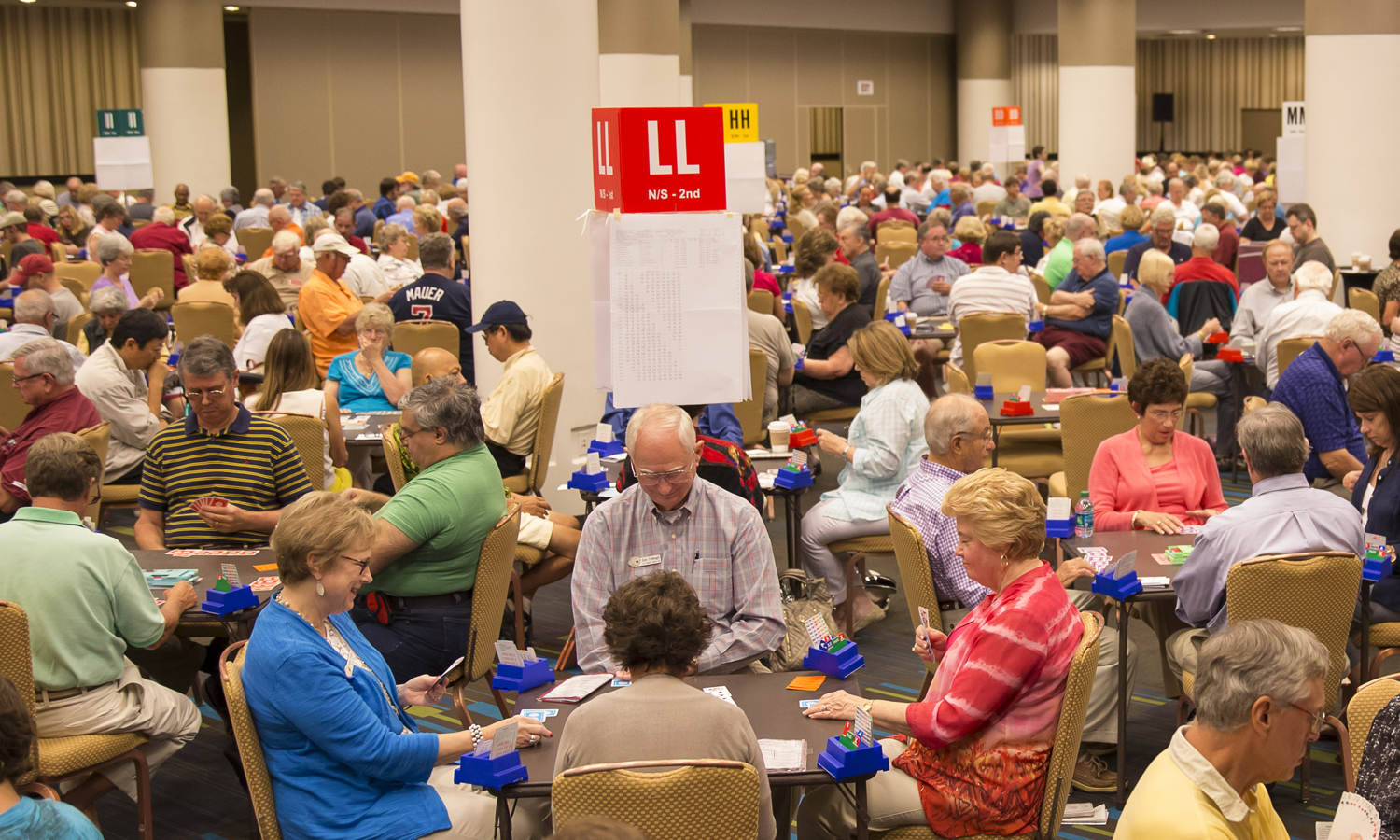Planning on attending a Bridge tournament in the new year? Alex has put together a helpful checklist to prepare you for your first tournament adventure.
Your First Bridge Tournament: A Checklist

Your First Bridge Tournament: A Checklist
By Alex J Coyne © 2016 Great Bridge Links
Planning on attending a Bridge tournament in the new year? Alex has put together a helpful checklist to prepare you for your first tournament adventure. But note, tournaments vary around the world. It’s always a good idea to visit the tournament website. On our Bridge Tournaments page, we list websites beside every event. But first, a little background –
In contract bridge a tournament is composed of multiple “events”. Some may be single-elimination, double-elimination, or Swiss style. However, “Pair events” are the most widespread. Similar to all duplicate bridge events, a number of deals (or boards) are each played several times by different players. For each such board the score achieved by each North-South (NS) pair is then measured against all the other NS pairs playing the same board. Thus pairs are rewarded for playing the same cards better than others have played them. There is a predetermined schedule of fixtures depending on the number of pairs and boards to be played, to ensure a good mix of opponents, and that no pair plays the same board or the same opponents twice. (Source: Wikipedia)
Directions & Directors
Make sure you know where you’re going and what time you have to be there. When it comes to tournaments, there’s no such thing as fashionably late, only disqualified. Double-check the directions before you punch them into your GPS , take a virtual drive around the neighborhood with Google Street View if it’ll help.
Suit up
Most tournaments have a dress code: If you can’t find it listed on the entrance form or rules or website, call the tournament organizers and ask. For example, the Copenhagen Bridge Invitational mentions the dress code as having to be suited for royalty. Because, well, it is: HRH Prince Consort of Denmark is part of the games. You wouldn’t want to show up to that in socks and sandals, would you?
Partnership Desk
Did you arrive at the tournament with a partner or will you be needing one once you get there? Most tournaments have a ‘partnership desk’ where you will be matched with a player of the same skill level as you. Visit the partnership desk first before purchasing your entry fee.
What event should you play in?
Club games and Unit games (USA) tend to hold one event at a time so you will need to choose only which stratification or flight you wish to play in. Bigger weekend tournaments, often called Sectionals, can have a few different events happening at the same time, and even bigger 10 day tournaments, Regionals and NBCs, can have many different events all scheduled for the same time slots. These tournaments will have online schedules which you can browse prior to showing up at the playing site. Or, your new partner might know what would be the best game for someone of your playing ability.
Entrance Fee
Most tournament events require the purchase of an entry – it will cover the fees for both you and your partner and indicate what table you will be seated at and in which direction. If you’re unsure of what game you should buy into, just ask the friendly people at the entry table. They will be happy to help.
Some tournaments require you to pre-buy an entry – you’ll find the information on their tournament website. Some club and special event games require you to pay at the door. You can find many tournament websites on our Tournament Trail listing.
Be Nice
Conduct and sportsmanship is, and should be, taken very seriously. Put simply, avoid being an ass-hat at or around the bridge table. This includes bragging and its opposite, being a terrible loser; unwarranted or rude comments, repeated violations of the rules and not taking the game as seriously as you should. Those will likely get you booted from every tournament in town.
If you’re seriously worried about what appropriate conduct at a bridge game should look like, you’ll find some tips in our article on A Look at Cheating.
Food & Drink
If food is involved or included in the event please note food and drink requirements in the rules and entrance fee, and ask the rest of the team if they have any special needs themselves. This includes taking your own food along, ordering food before or after the tournament (the rules tell you which, usually) and other needs like vegetarians in the team – hey, it happens, be prepared.
If you’re playing in a two-session event, you’ll need to go out and find food at the break. Food onsite is extremely rare, but tournament organizers will keep in mind that players will need to eat so try to pick a playing venue close to restaurants and cafes.
It’s not considered polite to have food at the bridge table during play, but some M&Ms, a mug of coffee or a bottle of water are usually fine.
Anything You Need to Tell Us?
Disclose any members at the table who might have special needs, including dyslexia, deaf or hearing impaired players or those who need, for example, wheelchair access. Certain medications will need an accompanying letter from your doctor to be allowed in tournament play, others are completely off-limits.
Get Your Game On…
If you’re a believer in the 10, 000 hour theory, it takes 10, 000 hours (likely much more) to start perfecting your skill. If it applied to Bridge games, how many would you have to play before you’re good? To the true player, it’s never enough.
Bridge is a life-long endeavor. Practice your game when and where you can. Hell, you can even play a couple games on your phone on the way to the tournament. To find Bridge Apps, check out our Apps page here –
You Can Decide to Watch!
If you decide not to play a session of bridge at a tournament you are welcome to ‘kibitz’ which means, watch for free. Kibitzers are always welcome at tournaments, and it doesn’t matter what your level of skill might be. If there are great or famous players at your bridge tournament, or friends, you can sit and watch them play! But before you do so, better know these general rules:
1. Kibitzers must select one table for kibitzing and may not move to any other table during a session or segment
2. Kibitzers may not speak with players, must watch only one hand at a time, may not sit in such a position as to see more than one hand at a time. Typically kibitzers place their chair to the right of left of a player and far enough back to not crowd but still be able to see what the player is holding.
3. Kibitzers cannot call attention to irregularities other than a board being placed incorrectly on the table (arrow positioning), but may serve as witnesses to a possible irregularity.
4. Kibitzers must enter the playing room before play commences. Kibitzers are required to remain until the segment of play is completed at the table they are watching or to leave the playing area entirely.
And this next rule is a modern one!
5. No one other than the Internet broadcast personnel and Tournament Directors may watch any computer screen or any other mechanism for enabling the Internet broadcast at any time in either the Closed or the Open Room.
If it’s a regional tournament –
This article on the District 25 website gives a good introduction to Regional Tournaments: Introduction to Regional Tournamens.
A regional tournament typically lasts 10 days and offers many different kinds of events. One session, two session or even four session events played over day. There are also events for all levels of player from absolute beginners to the best in the field.
If you learn of a regional bridge tournament nearby, we encourage you to show up and take it all in, either as a player or as a kibitzer. You can find a list of regional bridge tournaments in North America on the ACBL website.
Going global: International tournaments
Excerpt from Bridge For Dummies, 4th Edition Eddie Kantar
International tournaments are glamorous affairs, usually held in phenomenal locales such as on the French or Italian Riviera. The tournaments often take place in lush casinos, with large cash prizes going to the top finishers. The casino owners hope that after you win in the tournament you’ll want to play some of your prize money in the casino slot machines or at the baccarat tables.
International tournaments differ from the United States National Championships in several ways:
- They often award cash prizes rather than masterpoints. You win only glory and masterpoints when you play in U.S. sanctioned tournaments.
- You get to play in exotic locales such as Monaco (Monte Carlo) and France (Juan Les Pins, Paris, Deauville, and Biarritz).
- These competitions are usually big-money tournaments where you play one session a day, approximately 3:30 p.m. to 8:00 p.m. (The French like to sleep in and eat late dinners). In England, they play two sessions a day as tournaments do in the United States.
- You have a better chance of meeting and playing against many international stars.








